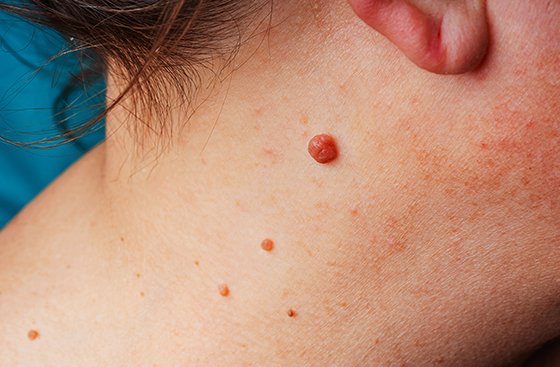Benign Skin Conditions
Epidermoid Cysts
Epidermoid cysts are small bumps that can develop anywhere on the skin but are most commonly found on the trunk, neck, and face.
These noncancerous cysts rarely cause any problems or require any treatment, however, they may be removed if they rupture, become painful or infected, or for cosmetic purposes.
Symptoms of epidermoid cysts may include a small round bump, a small blackhead at the opening of the cyst, thick yellow liquid that drains from the cyst, redness, or swelling in the area if it becomes infected.
While most epidermoid cysts do not cause problems or require treatment, see your doctor if you notice the cyst is growing rapidly, becomes painful or infected, the appearance is bothersome, occurs in an unusual location, such as a toe or finger.
The thin layer of cells that protect the surface of the skin are constantly sloughing off, however, epidermoid cysts develop when these cells multiply and move into the skin instead of shedding. At other times, irritation or injury to the skin or hair follicle can cause an epidermoid cyst to develop.
Inflammation:
Epidermoid cysts may cause inflammation, tenderness, and swelling. When it is inflamed, your doctor will wait until the inflammation reduces before removing it.
Rupture: If an epidermoid cyst ruptures, it can lead to an infection that will require prompt treatment.
Infection: Abscessed cysts may become infected, which can be painful.
Skin cancer: rarely, epidermoid cysts may result in skin cancer.
A doctor will perform a physical examination of the cyst to make a diagnosis. A skin sample may be taken by scraping off skin cells, then examined under a microscope.
If the cyst is not painful or causing any complications, it can often be left alone. Possible treatment options to discuss with a doctor include:
Injection: Injecting the cyst with medicine can reduce inflammation and swelling
Incision and drainage: This is a quick and easy method that involves a doctor making a small incision in the cyst and draining its contents by gently squeezing it, however, it is likely a cyst will return after this method.
Minor surgery: Minor surgery may be performed to remove the entire cyst. This is a safe and effective method that may require you to return to your doctor for removal of stitches. This will typically prevent the cyst from recurring.
Lipoma
A lipoma is a soft lump that grows under your skin, most often in the neck, shoulders, back, abdomen, arms, and thighs. It is usually harmless and isn’t cancer. A lipoma can feel doughy to the touch, without tenderness, and easily moves with slight pressure. Lipomas are most commonly found in middle-aged patients.
Treatment of a lipoma is usually unnecessary, however, it may be removed if it is painful, continues to grow, or becomes bothersome.
Lipomas are typically located just under the skin in the neck, shoulders, back, abdomen, and thighs.
They are usually soft to the touch and are easily moved by light pressure.
Lipomas are typically small, less than 2 inches in diameter, but it is possible they may grow.
They can cause pain if they contain many blood vessels, press on adjacent nerves, or continue to grow.
It is most likely that genetics are a factor in the development of lipomas.
A doctor may perform a physical examination to view the lipoma, remove a small tissue sample for examination in a lab, or use X-ray or image testing such as MRI or CT scan.
Rarely, small lumps that resemble lipoma are liposarcoma, a form of cancer that grows rapidly in fatty tissues. Liposarcomas are usually painful and typically do not move under the skin. If your doctor suspects liposarcoma, a biopsy, MRI, or CT scan will typically be done.
There is usually no treatment necessary for lipoma, although a doctor may recommend removal if it is growing, painful, or bothersome. Options for removal include surgery or liposuction.





Leave a Reply